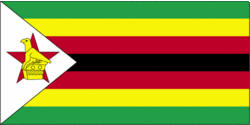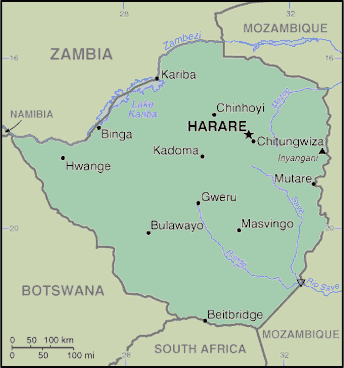Traveling Luck for Zimbabwe. Zimbabwe, Africa
Zimbabwe is located in Southern Africa, between South Africa and Zambia.
Land in Zimbabwe is mostly high plateau with higher central plateau (high veld); mountains in east.
Zimbabwean land covers an area of 390580 square kilometers which is slightly larger than Montana
Zimbabwe has borders with Botswana for 813km, Mozambique for 1231km, South Africa for 225km and Zambia for 797km.
 Zimbabwean national flag (Flag of Zimbabwe)
Zimbabwean national flag (Flag of Zimbabwe)
As for the Zimbabwean climate; tropical; moderated by altitude; rainy season (November to March).
Zimbabwean(s) speak English (official), Shona, Sindebele (the language of the Ndebele, sometimes called Ndebele), numerous but minor tribal dialects.
Places of note in Zimbabwe
 Zimbabwean map
Zimbabwean map
Regions of Zimbabwe
The UK annexed Southern Rhodesia from the [British] South Africa Company in 1923. A 1961 constitution was formulated that favored whites in power. In 1965 the government unilaterally declared its independence, but the UK did not recognize the act and demanded more complete voting rights for the black African majority in the country (then called Rhodesia). UN sanctions and a guerrilla uprising finally led to free elections in 1979 and independence (as Zimbabwe) in 1980. Robert MUGABE, the nation's first prime minister, has been the country's only ruler (as president since 1987) and has dominated the country's political system since independence. His chaotic land redistribution campaign, which began in 2000, caused an exodus of white farmers, crippled the economy, and ushered in widespread shortages of basic commodities. Ignoring international condemnation, MUGABE rigged the 2002 presidential election to ensure his reelection. Opposition and labor strikes in 2003 were unsuccessful in pressuring MUGABE to retire early; security forces continued their brutal repression of regime opponents. The ruling ZANU-PF party used fraud and intimidation to win a two-thirds majority in the March 2005 parliamentary election, allowing it to amend the constitution at will and recreate the Senate, which had been abolished in the late 1980s. In April 2005, Harare embarked on Operation Restore Order, ostensibly an urban rationalization program, which resulted in the destruction of the homes or businesses of 700,000 mostly poor supporters of the opposition, according to UN estimates.
The government of Zimbabwe faces a wide variety of difficult economic problems as it struggles with an unsustainable fiscal deficit, an overvalued exchange rate, soaring inflation, and bare shelves. Its 1998-2002 involvement in the war in the Democratic Republic of the Congo, for example, drained hundreds of millions of dollars from the economy. Badly needed support from the IMF has been suspended because of the government's arrears on past loans, which it began repaying in 2005. The official annual inflation rate rose from 32% in 1998, to 133% at the end of 2004, and 585% at the end of 2005, although private sector estimates put the figure much higher. Meanwhile, the official exchange rate fell from 24 Zimbabwean dollars per US dollar in 1998 to 96,000 in mid-January 2006. The government's land reform program, characterized by chaos and violence, has badly damaged the commercial farming sector, the traditional source of exports and foreign exchange and the provider of 400,000 jobs, turning Zimbabwe into a net importer of food products.
Zimbabwean natural resources include coal, chromium ore, asbestos, gold, nickel, copper, iron ore, vanadium, lithium, tin, platinum group metals
landlocked; the Zambezi forms a natural riverine boundary with Zambia; in full flood (February-April) the massive Victoria Falls on the river forms the world's largest curtain of falling water
Zimbabwean religion is syncretic (part Christian, part indigenous beliefs) 50%, Christian 25%, indigenous beliefs 24%, Muslim and other 1%.
Natural hazards in Zimbabwe include recurring droughts; floods and severe storms are rare.
Travel Advice for Zimbabwe
ZimbabweSUMMARY
- There has been a general increase in the level of violent crime. There is a continuing risk of violence at political demonstrations, but main tourist areas have been largely unaffected by political and social unrest.
- We advise against visiting high density, low income, urban suburbs.
- You should avoid engaging in overtly partisan political activity, or in activities that could be construed as such.
- We recommend travel with organised tour operators to well-established destinations. We strongly advise against independent travel, particularly back-packing.
- You should be aware of the global risk of indiscriminate terrorist attacks, which could be against civilian targets, including places frequented by foreigners.
- The main type of incident for which British nationals require consular assistance in Zimbabwe relate to minor crimes where financial assistance is required and/or replacement passports need to be issued.
- We strongly recommend that you obtain comprehensive travel and medical insurance before travelling. You should check any exclusions, and that your policy covers you for the activities you want to undertake. Please see: Travel Insurance
SAFETY AND SECURITY
Mugging and pick pocketing is common in Harare and other city centres, especially after dark. You should be particularly cautious when leaving banks and cash points. Visitors to Victoria Falls, national parks and other tourist centres should be wary as tourists, particularly backpackers, are the principal targets for casual thieves. Wherever possible, you should travel with a recognised tour group or operator and should always avoid travelling alone. You should avoid visiting the high density (low-income) urban areas where crime is on the increase and incidents of unrest or protests can occur.
Zimbabwe Country Profile.
The EU has published a list of air carriers that are subject to an operating ban or restrictions within the European Community. You should check the following link to see whether this will affect your travel: http://europa.eu.int/comm/transport/air/safety/flywell_en.htm. Prospective domestic air travellers should be aware that there are continuing reports by some Zimbabwean media organisations, which express concern about the safety of aircraft used for internal flights.
LOCAL LAWS AND CUSTOMS
ENTRY REQUIREMENTS
Visitors are currently being given entry permission for anything up to 90 days. You are strongly advised to check that the number of days given at the port of entry covers your intended period of stay, although you can apply to have this period renewed and extended if required. We recommend that before you travel you should first check current entry requirements with the Zimbabwean Embassy.
Single parents or other adults travelling alone with children should be aware that some countries require documentary evidence of parental responsibility before allowing lone parents to enter the country or, in some cases, before permitting the children to leave the country. For further information on exactly what will be required at immigration please contact the Zimbabwean representation in the UK.
HEALTH
Private clinics will not treat patients unless they can pay. Medical costs, particularly for evacuation, can be high. There is a shortage of drugs in public hospitals. If you are on medication, you are advised to bring sufficient supplies of your medication to cover the period of your stay.
Although not present in Harare and through much of the Highveld (central districts), malaria is prevalent in most other parts of the country, particularly in low lying border areas including the Zambezi Valley, Victoria Falls, Hwange National Park in the low lying parts of the Eastern Highlands and the Vumba, around Mutare.
More than three quarters of British travellers who contracted malaria in 2005 did not take preventive measures, such as malaria prevention tablets. However, malaria can occur despite appropriate prevention, and you should seek medical care in the event of a fever or flu like illness in the first year following your return from travelling to a malaria risk country. Before travelling you should seek medical advice about the malaria risk in Zimbabwe.
There has been an outbreak of cholera in Harare. Another outbreak in south-east Zimbabwe which was first reported in December 2005, has resulted in several deaths in the districts of Chikomba, Chivhu and Buhera. Routine food and hygiene measures should be observed whilst traveling in all parts of Zimbabwe (medical practitioners can advise). You should take particular care with any foods bought at the roadside or in the markets, drink or use only boiled/bottled water, and avoid ice-cubes. Anyone suffering diarrhoea during a visit to affected areas in Zimbabwe should consult a doctor immediately.
Zimbabwe has one of the world's highest HIV/AIDS infection rates with approximately 20% of the adult population infected.
In January 2007, there have been reports of anthrax in Masvingo province.
You should seek medical advice before travelling and ensure that all appropriate vaccinations are up-to-date. For further information on health, check the Department of Health website at: www.dh.gov.uk.
GENERAL
Hard currency is difficult to come by locally. You need hard currency to pay for hotel charges and entry to Victoria Falls and many other national parks: park entry fees vary from up to 15 pounds sterling or 25 US dollars per person. It is advisable to have small denomination notes, as change is sometimes unavailable. All airlines, with the exception of Air Zimbabwe, now include a departure tax in the price of their tickets.
The Government of Zimbabwe has recently devalued the Zimbabwean dollar and deducted three zeros from the currency. 1,000,000 old Zimbabwean dollars (issued as bearer cheques) are now worth 1,000 new Zimbabwean dollars (bearer cheques). As from 21 August 2006, only the new bearer cheques are valid. There is no limit on the amount of foreign currency a foreign tourist can take out of the country although you may be asked to declare how much foreign currency you have in your possession. You are only allowed to take limited amounts of local currency out of the country. Current limits are Zim $5,000 cash or bearer cheques. Amounts in excess of this must be handed in at the airport/border. It is illegal to exchange foreign currency in Zimbabwe anywhere other than at officially licensed dealers (e.g. banks). If you are using credit cards, you are advised to check the rate of exchange before completing any transaction.
There are frequent power cuts and water shortages.
There is an EU arms embargo on Zimbabwe. It is an offence in UK law to take firearms into Zimbabwe at the current time, even if you intend to bring them back to the UK at the end of your visit.
Long term visitors and residents should register on arrival with the British Embassy in Harare.

 Search
Search Zimbabwe country profile
Zimbabwe country profile Travel advice for Zimbabwe
Travel advice for Zimbabwe